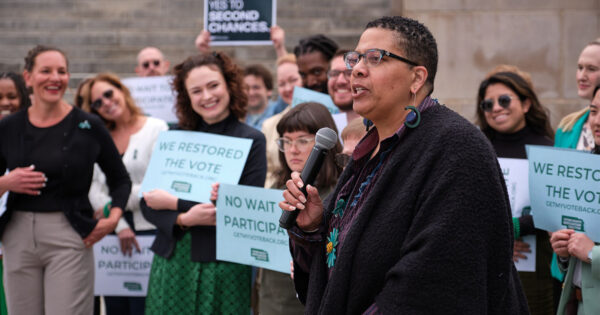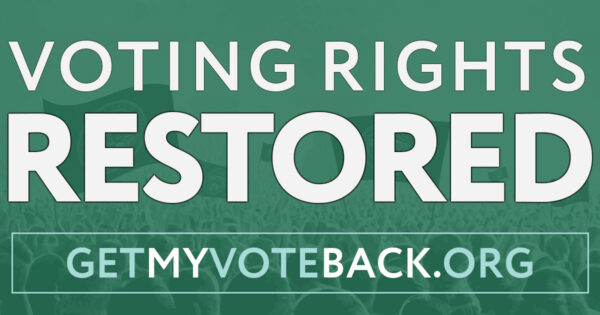On Feb. 24, 2021, Director of Public Policy Westin Miller gave the following testimony to the Government, Military, and Veterans Affairs Committee of the Nebraska Legislature on a pair of proposals that will re-enfranchise thousands of Nebraska voters.
The first proposal was LB158, a proposal from Sen. Justin Wayne of Omaha that eliminates an additional two-year waiting period for former felons to be eligible to vote. Civic Nebraska supports LB158. Westin’s testimony:
I want to thank Sen. Wayne for continuing to champion this issue. Sen. Wayne’s approach to this should be a no-brainer. It’s so moderate, so reasonable. If you’ve served your time you should be able to vote. Civic Nebraska is opposed to the entire notion of felony disenfranchisement, which I’ll elaborate on in the next hearing, but for now, I want to focus specifically on eliminating the two-year waiting period.

Nebraska has one of the strictest laws in the nation on this issue. We are one of only three remaining states who disenfranchise all felonies for a period of time beyond their actual sentence. The nasty history and intent of some of these laws are undeniable, and I’d be happy to elaborate on that, but I want to focus my short time on modern-day opposition.
Since 2005 when Nebraska first started changing our felony disenfranchisement laws, there has been a fundamental flaw in how our policymakers approach this issue. This was clear in 2017 and in 2019 when Sen. Wayne and advocates were challenged to prove that changing our policy would result in a net benefit like reduced recidivism. In Gov. Ricketts’ 2017 veto letter of LB75, he said, “proponents of LB75 contend there will be an increased civic engagement by felons voting and that will help reduce recidivism. However, studies have failed to demonstrate a link between the restoration of voting privileges and reduced recidivism rates.”
Vetoing a bill like this because it isn’t guaranteed to make things better fails to recognize the obvious: 18-year-old-citizens, as a default, have the right to vote. It’s not a privilege to be earned, it’s a right to be furiously protected.
We believe that when the state attempts to restrict any Constitutional right, it has the burden to prove both the necessity and the effectiveness of doing so. The State of Nebraska has failed to prove both that our current two-year-waiting period is necessary and that our current policy does anything positive. The state has produced no evidence of reduced recidivism, no positive public safety impacts, just thousands of Nebraskans who cannot vote.
Remember, the default position for 18-year-old citizens is, “you get to vote.” That state is the one infringing on Nebraskan’s Constitutional rights. They ought to be able to prove why doing so is necessary and effective. They can’t.

The second proposal was LR10CA, a proposed amendment to the Nebraska Constitution that would enable felony re-enfranchisement, with the exception of those convicted of treason. It was introduced by Sen. Machaela Cavanaugh of Omaha. Westin’s testimony:
At last year’s hearing on this issue, this was a fairly new idea to us, so I walked the committee through our thought process. Essentially, we can’t find an evidence-based reason to support Sen. Wayne’s proposal but not Sen. Cavanaugh’s.
I really only want to make one important point. I know all of you place a high value on the Constitution and protecting Constitutional rights. It would be weird and arrogant of me to tell you what that relationship ought to look like for you. But I am asking and will continue to ask for you to simply be consistent in how you treat Constitutional rights.
Members of this committee, when it comes to First Amendment and Second Amendment rights, are great about asking two questions:
1) does the state really need to restrict this right?
2) is the policy actually doing anything positive?
All I’m asking is that you ask those same questions about this restriction on our voting rights. I’m not an expert on gun policy and I’m all for an honest debate about public safety, but I think we can all agree that if somebody came before this body and said “It’s OK to restrict our Second Amendment rights simply because that’s how we’ve always done things,” every member of this committee would find that ridiculous.
I really don’t understand how or why our voting rights should be treated differently.
The right to vote is enshrined in four different Constitutional amendments. It deserves the same protection you give to the First and Second amendments. The state has failed to prove that restricting voting rights of convicted felons is necessary or effective. The state has produced no evidence of reduced recidivism, no positive public safety impacts, just thousands of Nebraskans who can’t vote.
![]()



